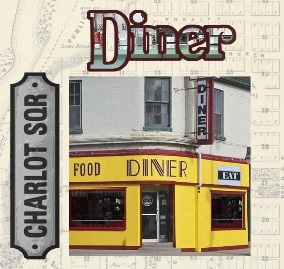
The Diner
I was only eight years old when I started working at my parent's diner on the corner of Charlot Sqr and North Port Washington Road. Our diner has a curved front to match the corner with big windows and an apartment on the second floor. We lived in the apartment until I was ten, when my parents bought their house.
I was always around our diner since I was born, but at the age of eight, I was now a big girl and old enough to help out. When I was little I mostly cleaned tables and delivered ice water, and then at thirteen is when I started waitressing, but still did not get to run the cash register until I was in high school.
My craziest day at the diner was on a special night when I was seventeen. It was June and my parents' twenty-fifth anniversary. They had planned on celebrating that Sunday, but I surprised them. At seven-thirty, after the dinner rush was gone, I gave them an envelope with tickets to the moving pictures show "The Tramp" which everyone in town was claiming was the funniest motion picture they had ever seen. The opening was in fifteen minutes, so they had to hurry and could not say no. That left only me, cook Mel, and busboy and dishwasher Goldie. Three people for a whole diner is not much, but there usually were not many customers after eight. Usually.
It was eight-thirty and only thirty minutes until we closed when a couple factory workers walked in from the works down on Canal Street. One of them was Schneider, a guy that sometimes came in for a late lunch before heading to the factory. Then, to my surprise, the door open and fifty more workers piled into our diner. They filled up the counter and every booth, and as I looked at Schneider with my wide eyes, he explained, "Our cafeteria had a fire earlier today. I told everybody what a great little place you have here, girlie." I about cried.
I ran back to the kitchen and Mel told me the grill was already off and there was only a few cups of today's soup. I looked in the icebox and saw a large longaniza sausage. I knew I could not turn away all these customers, so I made a plan. I called to Goldie to get bread from the pantry and went back out to our over-flowing diner. I told the workmen, "Well, we were only a few minutes from closing and most of our staff have left. But we can serve you. But it will have to be a double bologna sandwich, with cheese, relish side, and a bottle of soda. No substitutes." Most of them nodded their heads, and one of them asked if there was any coffee, and I told him they could have what is left.
We formed a line in the kitchen. I cut the bread, Mel sliced on the meat and cheese, and Goldie scooped on the relish. I ran every plate out to the customers. At one point I had sweat running down my nose, and I would have to shake it off so it did not land in anyone's food. But within a little over an hour, all the workmen had eaten, paid, and left. We made more in receipts in that hour than we had during our whole dinner service. I was exhausted and I told Goldie he could have all my tips if he stayed after close and washed all the dishes and cleaned the front. He agreed, and Mel and I left. My parents had a good laugh when I told them about it when they made it home later that night.
Despite working in the diner, I had imagined training and becoming a nurse, but I had always put off the schooling for it. Then America entered the big war in Europe. I thought this would be my chance to accomplish my goal. I signed up and went to Red Cross nurse training in Chicago for two months and then sailed the six days to France. I was stationed at base Hospital No.7 in Dannes-Camiers. And after twelve months of blood, and dismemberment, and hearing screaming men die, I had had-enough of medical service. I returned to my parents cozy diner and was glad to be home.
One day my father was complaining about the cost of meat for our diner. I told him that I heard that the owners of the butcher shop on Brick Lane wanted to retire and were selling their store. Father said he thought that was a good idea, but money was too tight for a down payment on a new business. I smiled and told my father that I still had all the money I earned during the war. My father smiled back.
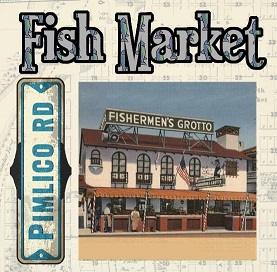
Fish Market
My great grandfather came to California from Asia in 1856 during the gold rush. He had a claim and mined it for a few years with my uncle. It was a good claim and they made enough money to bring more of our family to America. Then one night many men came to the camp on my great grandfather's claim and they told him and my uncle to leave. My great grandfather refused and the men beat him and tore the camp apart. The next day my great grandfather went to the local sheriff, but the sheriff told him his claim had been dissolved and he and his family should leave. My family sold what they could and left town.
It was difficult for Asian people to find work in anything except doing laundry and working on the railroad. My great grandfather loved having a job where there was an element of discovery in every day of work. So he started working on fishing boats, first on dories or schooners and then later on big steam trawlers. He said the thrill of the catch, hauling in the nets, excited him greatly, whether there was a hundred fish or just a small crab. My great grandmother knitted a sign that hung on the wall that had his favorite proverb, "Look for a thing until you find it and you will not lose your labor."
Later, when my great grandfather was too old for all the heavy work of the fishing boats, he worked in the fish markets. My grandfather worked there too. It was he that saved his money and bought our building on Pimlico Road that would be our family fish market. It would pass to my father, who would also teach the business to me. When I was little all I got to do was pull pin bones out of the fish with plyers. When I was a little older, I got to use a scaler. When I was thirteen I got my own filleting knife and was taught how to clean fish and shuck clams and oysters.
It was also my father that started our tradition of fish throwing. It was a busy market day and a lady wanted a fish in one of the outside ice boxes. A seller (the men that stood out by the boxes) carried the fish inside but there were so many people standing around the counter, the seller could not hand the fish to my father, who was ready to weigh it, wrap it, and price it. So my father yelled to the seller, "Just throw it." And the customers were all amazed at the sight of a flying fish. A week later my father dropped a thrown fish and adapted his technique of keeping a towel in his hands to help catch the slippery fishes. And the created the slogan, "You know it's fresh if it can still fly." Seeing the flying fish is a big draw for our business.
I always wanted to travel across an ocean, like my great grandfather, so in 1917, I joined the Army and went to the war in Europe. War was not as romantic as books tell. Terrible food, you are always hungry, and dirty, and constant explosions. Lots and lots of explosions. I was glad to come home. I am a fourth generation fish monger, but I want to expand our business. Not just with fish, but with everything that goes into our market: the fish, the ice, the equipment, the advertising, everything. Where do I start?
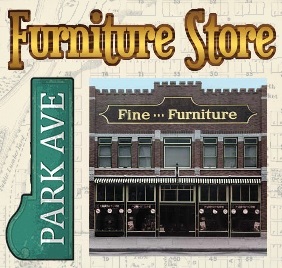
The Furniture Store
My father was born in Bavaria, Germany, about fifty years ago. He was born into a successful clock making family. One of my great uncles even had a royal warrant and made clocks for the Kaiser. But my father wanted to grow his business and believed his clocks would outshine all others in the new world. So he sold his part of the family clock shop and moved to America.
My father said his greatest difficulty here in his new home was finding all new suppliers. The black forests had millions of lindenwood trees (known as basswood in America) but not quite as many in America. So my father switched to pine, walnut, and oak. Oak is very popular here, but a very hard wood to work with, so my father had to adapt his techniques. And at first, my father took pride in his German heritage. I was born only a few years after my father set up shop in America.
When I was twenty years old came the worst day of our lives, the 7th of May, 1915. A German U-boat sunk the passenger liner the Lusitania. More than a thousand civilians died, including many women and children. And over a hundred of the casualties were Americans. After that, orders and sales of my father's clocks plummeted. No one wanted to buy from a shop with a German name out front. A year later my father was selling clocks for less than the cost of the materials he had in them. In 1917, he closed his shop and took odd jobs as he could find them. I, on the other hand, enlisted in the Army. My family was German, but I wanted to serve my birth nation.
You hear many horror stories about how terrible the war was, but I was lucky. I never stood all day and night in water-logged trench. I was never shot at, nor did I have to don my gas mask. My life was never in peril. I wanted to fight for my country, but once the Army found out I spoke fluent German, they put me in a room translating German newspapers, personal letters lost by German soldiers, and anything they found written in German. Occasionally I would go to a bunker near the front and listened to intercepted radio transmission. A fellow soldier, braver than me, would sneak out with a long wire and tap into a German line. And I would sit at the end of that long line and type everything I heard. I did not get any medals for bravery. I just did what I was told.
After the armistice, I came home to my father's dust-covered shop. I did not have my father's skill in making the delicate workings of a clock, so I made furniture. I bought a store front in town on Park Avenue and opened my first furniture store. Despite being a veteran and a proud American, I left our family name off the sign out front. Prejudices die hard. I hired my father to help out, and sales are good. I even have a plan to get into the business of wood suppliers so I can lower our costs. There just so happens to be a saw mill for sale down on Lombard Street. Wish me luck.
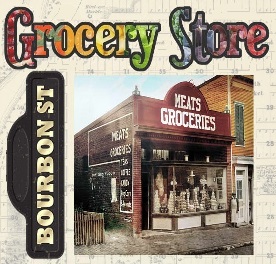
The Grocery Store
In 1864, my grandpappy was a teenaged slave on a tobacco plantation in Georgia. The Union army came through and told all the slaves that they were free. Then the army looted the main house of its silver and other valuables and moved on. Nearly every slave, with nowhere else to go, stayed put and waited for the master to return. My grandpappy saw an opportunity and took some clothes from the big house and left the plantation. He walked north.
He relied on the generosity of others for many days until he reached a large city. Walking through an alley next to a general store, he noticed other colored folk coming out the back door with goods. When my grandpappy went through the front door and, despite his nice clothes, the store owner yelled at him that he had to use the back door. Grandpappy went around to the back door and was met by the same owner, who then asked him what he wanted to buy. My grandpappy told him all he wanted was a job. Grandpappy surmised that a store that was willing to sell to Negros, might be willing to hire a Negro. And he was right. The store owner's last bagger had quit on him recently and he did not have a problem with a colored worker serving colored patrons. And just like that, my grandpappy had work that paid him for the first time in his life.
On his first day of work, Paul Port, that same store owner, asked my grandpappy if he could read or write. Grandpappy answered with "Some," but it wasn't long before he could read and write, well, at least read or write the words for everything in the store. You see, all the shelves were labeled, so when a backdoor patron asked for flour, he would go to the shelf that had flour on it and saw the word "flour." And doing the same with flax, fava beans, fennel, and fat, he learned what the letter F sounded like. And he did the same with crackers, candy, coffee, and cabbages.
Grandpappy worked at Paul Port's store for years. He met and married my nana and had children. Business got so busy out the back door that owner Paul decided to open another store, dedicated to colored customers. So he started renting a building in the colored part of town, stocked it, and put my grandpappy in charge. Paul Port was afraid of fuss and grief from his customers at his regular store, so he told no one about his second store. He came after hours, collected all the money in the till, and gave grandpappy the money to pay the landlord and suppliers when the time came. No one really ever saw Mr. Paul Port at his second store.
Many more years passed and ole Port died. Grandpappy went to his funeral and he told Paul's children how grateful he was for their father. He told Paul's children about the second store, and they said they wanted no part in it. So my grandpappy took over ownership. Which actually wasn't much. The building was leased and the stock on the shelves were invoiced. Grandpappy had never run the business side of a store before, but he learned fast. He paid the landlord and suppliers from the cashier till when the time came, and what was left over, he kept. And that is how my family got into the grocery business.
I was born in 1897 and worked in our store when I was old enough. My father ran the store by then and grandpappy mostly sat in the back office, reading the newspaper, swatting flies, and telling stories. A few years before the big war in Europe started we moved into a nicer brick building on Bourbon Street, with big glass windows out front. Our new grocery store is so nice, that even some white people come trade here.
America entered the great war and I felt the call of patriotism and joined the Navy. With my grocery experience I became an assistant to the ship's chandler and spent my year holding a clipboard instead of a rifle. I remember talking to some stevedores loading ships and they all said the same thing: the people supplying the navy made more money than the people in the navy. And I took that knowledge home with me after the war. My father was so proud of me when I came home from the Navy that he framed my blue service coat and hung it on our wall in the store. I told my father about my idea of getting into the supply business, and he said I could do whatever I felt was best because I was in charge now. I asked him what he was going to be doing now, and he said he was going to go play checkers with pappy in the back office.
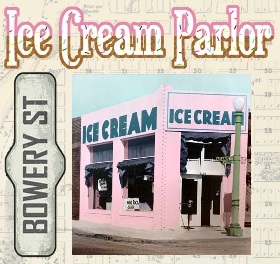
The Ice Cream Parlor
Greater Syria was a region of the Ottoman Empire. It is broken up now, but it is where my family is from, near Hermel. My family has always dealt in the exotics which made our stall at the market a favorite of townspeople and tourists. For ages it was importing jasmine perfume from India. But because of uprisings there in the 1850s, our contacts were lost to us and we looked for a new product. After that we imported silk from China. The beautiful scarves and tunics sold well. Yet again, around 1900, a rebellion in a far off land did away with that trading partner.
My father realized the politics of distant countries made importing goods too risky, so he turned our family toward another exotic that he could procure domestically, ice. My father would spend all winter pushing horses, oxen, donkeys, and any animal that could pull a load, up the narrow trail of the Jabal Lubnan Mountains. They were covered in snow and my father would pack his wagons with snow and ice and haul them back down to a cave near town. Ice was a rare and expensive commodity and he hired men to guard the cave.
Selling ice during the summers was very lucrative, but soon he found something more striking, ice cream. My father always admired America, because of their freedom from sultans, and kings, and invading armies. My father had learned that America's first president had a love for ice cream and he used that as a selling cry, "Ice cream, meant only for America's greatest presidents." He had gotten a large wooden ice cream maker from France, and the other ingredients were local also. Sugar from mills in Beirut and salt from skimming ponds in Tripoli. The milk, of course, came from nearby cow and goat herders. For over a decade our stand at the bazaar sold ice cream, with the fruit of the season, and our family wealth grew once more.
I was born during the reign of Sultan Hamid II, "Hamid the damned" they called him because of his ineptitude. In 1914, the great war broke out, and we were dragged into another losing war again. All because of some duke that was killed in some far off European country, and my father was done with politics ruining his family businesses. His goal was to get us to America. We first went to Egypt, and from there my family went on to the United States, however, I stayed behind. I had joined the Egyptian Expeditionary Force of the British military that was guarding the Suez Canal. It seemed like an easy choice, they were acceptable to foreigners joining, and we were far from the fighting, at first.
Just over a year in, we fended off a huge attack by the Central Powers at the Battle of Romani. Then my corps were to invade Palestine, but I was able to convince my commanding officer that I could not, in good conscious, fight my former countrymen. I had no love for the Sultan, but I could not shoot at my fellow people. Fortunately, they let me finish my service in relative quiet in north west Africa. After the armistice, I moved to America.
My father already had a thriving ice cream business when I returned to him. We had an actual building to work in, and more flavors than ever. And best of all, American people have so much money. But my father did not have a cave nor any snow-covered mountains. He was buying his ice from someone else. That is where I come in. I am going to expand our family business into everything that goes into our delicious ice cream. I think I will start with an ice truck.
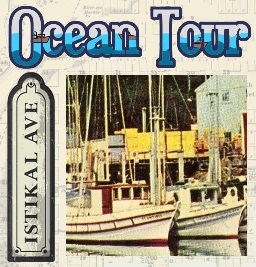
The Ocean Tour
My father crossed the border into America when he was a boy. He describes it as this harrowing journey where they were attacked by coyotes, bears, and evil gauchos. I don't think it was that bad. My dad likes to tell tall tales. They settled in a border town, where he later met my mother. They married and moved to a seaside town and my father fell in love with the sea.
My father got jobs on fishing boats, and before they bought a house, he bought his first boat. Not much, a little 12-ft catboat. About a year later, he and my mother were taking the ferry to a nearby resort island. They saw a couple already on the ferry when they boarded, and they noticed the couple did not get off at the island. My father asked the couple about this, and the couple answered that they just liked riding on the water. This gave him and idea for a side business. A week later my father put an ad in the newspaper for ocean tours. He also traded in his catboat for a 16-ft yawl that had a cabin.
The tours were for one to six people and lasted a few hours. He took them all around the bay and shore, and if the sea was calm, out into the deep ocean. People could fish too, although they rarely caught much. If the patrons didn't bring their own food, he would sell them drinks and sandwiches. After my grandmother moved in with us, we started serving ocean tour passengers tamales and enchiladas made by her. At our house, my mother would babysit younger children of patrons who did not want them on the boat. I was born by that time and I grew up around many of these kids.
When I became a young man, I would help my father with the tours, but never without him. One day he was sick and canceled the tour for that day. I was very mad at him because he said I was not old enough to go out on my own. The next week, I enlisted in the Navy and went to war. And then my father was very mad at me. I had always wanted to know what it was like to sail on a large ship, and after I got my taste of it, I didn't like it. Crowded, noisy, and smelly.
I served aboard the armored cruiser USS San Diego and our tour was mostly uneventful except when we were closest to America. In July we were very near New York City we were hit with an explosion. The captain believed we were under torpedo attack from a German u-boat. He ordered our gun to open fire on anything that looked like a submarine periscope. So our 6-inch and 8-inch guns starting blasting the water, all while our ship was slowly sinking. Too many compartments flooded and we were soon ordered to abandon ship. It was later determined that we hit a mine. I thus had the glorious distinction of serving on the only America capital ship sunk during the war.
When the war ended and I came home, my father did not treat me like a deckhand anymore, and gave me the helm of our family business. I remember that day clearly, I was already aboard loading stores, and when my father walked up to the port side, he saluted me and said, "Permission to come aboard, Captain?" I am thinking of upgrading our ocean tour to a double-mast 20-ft ketch, but I don't know if that will make us more money, or just add to our costs. I think we should buy the dock building on Charlot because it has a huge sign atop we could use to promote our ocean tour. That should save on advertising costs.
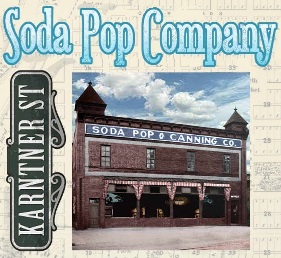
The Soda Pop Co.
Most people would be surprised to learn that soda pop has been around for thousands of years. Fizzy water is created naturally where carbon dioxide has dissolved into water deep underground then comes up to us in springs. If that water also has lots of minerals dissolved into it, then it may also be called mineral water. The ancient Greeks would add fruit flavoring to fizzy water and they essentially had what we drink today. Soda was added later to lessen the acidic taste and increase bubbles in alcoholic versions.
A few hundred years ago they started infusing water with carbonated bubbles and access to a spring became unnecessary. That is where my dad comes in. He was a manager of bottle works in a big city, and the company he worked for wanted to expand. They sent him to the other side of America to start a new factory, and he was supposed to be there only for six months. That turned into a year, then two years. We had stayed behind in the big city and only saw my dad on holidays. But after three years, my dad told the company to hire a new manager, or relocate his family. The company chose the latter, and we moved across country.
Oddly enough, within a few months of moving, the company decided to close my dad's factory. Sales were not as robust there as they were back in the big city. seeing an opportunity, my dad borrowed some money and offered to buy the factory, and the next thing you know my family owns a soda pop company. My dad immediately added new flavors and increased distribution.
Our biggest event was when I was twelve and we all went to the World's Fair in St Louis. We had a big booth with all our soda pop and me and my little brother would stand in front of our booth and ask passer-bys to come and try our drinks. I wore a red and pink dress and my brother was in a little blue suit. My brother and I would sing short ragtime tunes to catch people's attention. When not "hawking," we would take turns walking around the fair with mom. We would go in all these fancy marble buildings and look at weird loud machines. I also saw former president Grover Cleveland, heard John Philip Sousa's band play, saw Indian Chief Geronimo stare back at on-lookers, and listened to Helen Keller talk. Quite an experience, although I didn't know that a chance meeting my dad had there would affect my life so greatly.
A few years later, my dad received a letter from Colonel Gorgas, a man he had met at the fair. Gorgas was working on the Panama Canal and asked my dad to deliver to him as much tonic water as possible. The quinine of tonic water was known to combat malaria. For the next few years, half the bottles we made were tonic water headed to Uncle Sam. Then when I was seventeen, we all went to Panama to see the "big dig."
It was there I met my future husband, who was a young Army engineer working on the canal. We wrote letters back and forth for two years, and on a visit to my hometown, he proposed to me. We returned to Panama and were married in church and resided in a hotel built by the Army. We returned to America in 1914 shortly after the canal opened. In 1917, my life turned down a terrible path as our nation entered the great war in Europe. I went with my husband to France where he helped build bridges and railroads. I did not officially join the Army and instead worked as a volunteer in the hospitals and convalescent homes.
Shortly after I went to war, my brother signed up. I only got a few letters from him before he went missing during the Meuse-Argonne Offensive. The war ended only a month later but my brother was still missing. We returned to America, but my mom was fanatical about my brother. She grabbed me by both arms and told me to go back to France and find my brother. I went back and, with my husband's connections, was allowed to search through all the casualty records of Meuse-Argonne. I found no definitive answer other than to have my brother listed with all the missing soldiers' names that are engraved on the walls of the memorial chapel.
The war ended almost a year ago, and my mother still thinks my brother is going to walk through the door any day, but I saw the terror of war with my own eyes, and I don't know how anyone survived it. The loss of my brother has affected my dad also. He just doesn't seem to want to work anymore and rarely goes to the factory. So it is all up to me now. I have taken over running our Karntner Street soda pop company and I am looking to change things. Glass bottles break too often and I have an idea. I saw alot of food in cans during the war, and I wonder if our drinks will sell in cans. I am about to find out.
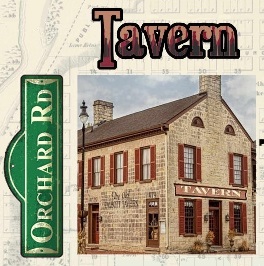
The Tavern
My grandfather was a young man when he escaped the famine. He rode a crowded ship across the Atlantic from Eire to America. He always said that half his family died of the blight, and halved again on that coffin ship. The old country had no food, and the new one had no jobs, since "Irish need not apply." But within a year, the states were at war with each other and my grandfather found three square meals in the Army.
But grandfather wasn't a soldier for very long. At Manassas a cannonball hit a log palisade and shot a hundred splinters into his leg and side. Field surgeons removed more leg than wood and he had a noticeable limp after that, and his marching days were over. They placed him and four other crippled soldiers on a buck board and sent them home. My grandfather lived the farthest away and therefore when the fourth soldier was dropped off, he was alone on the wagon. Yet, he had a new mission.
A few days later my grandfather arrived at a Bushmill warehouse where a cousin worked. He bought as many cases of Irish whiskey that he could with half the money he had, and set out for our nation's capital. Because being in the Army, he saw what they gave their soldiers. The Army gave them uniforms, boots, rifles, and blankets. The army didn't give their men liquor, but they did give them money. And my grandfather saw what they would pay for liquor. A short time later, he arrived at the Potomac River where the Great Army of the Republic was guarding the District of Columbia. With his uniform, he could ride right into camp and sell his wares.
My grandfather made alot money in those five long years of war. Enough to buy the fanciest tavern in town, on a street that used to run out to an old orchard. Ornately-carved mahogany shelves, mirrored walls, stamped tin ceilings, and shiny brass fixtures. Our public house had more stouts, whiskeys, gins, and ciders than most people could count. My grandfather, and then my father, were proud bar owners, and I was expected to be the same. However, in 1917, America joined the big war on the side of Britain and France. I enlisted with many of my friends, but my father forbade me to leave.
Although my father was born in America, he had all the hatreds of the old country. He despised the English crown and demanded that I not fight in their war. I believed in Irish independence too, but I felt a stronger duty to my country here and now. So I got no shipping-out party like others I knew. I did not speak to my father for a month, and left in late May for France.
I served in the 165th infantry of the 69th regiment. We fought at Champagne, St. Mihiel, and Argonne. I earned a stripe for each battle and came home as a sergeant. My father bore me no resentment and admitted that he was proud of me, not ashamed. Within a year, it was all behind us, and there were more problems ahead. For a while, I had been urging my father to expand our business. Either making furniture like we had in our place that everyone complimented us on, or buying a cave near the river to harvest and store ice during winter. But my father was all worried about the talk of new laws prohibiting alcohol consumption. So I told him that is more of a reason than any, that we should widen our dealings.
